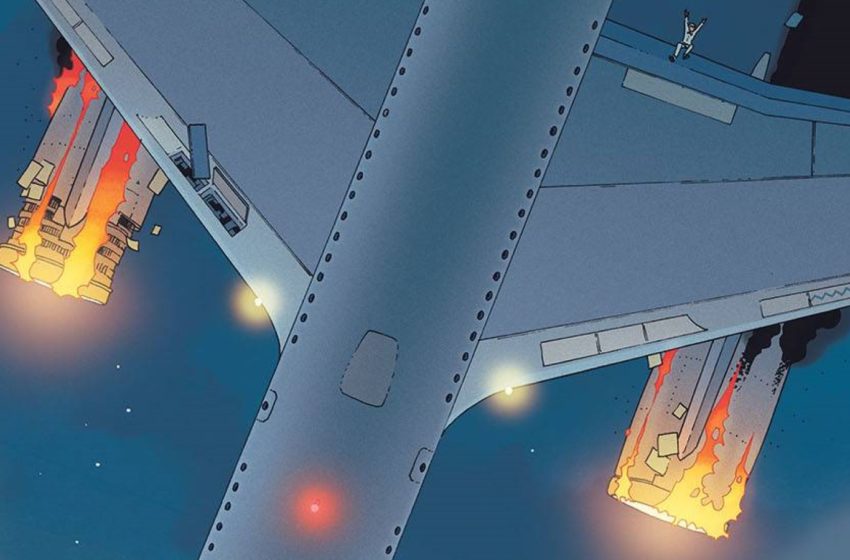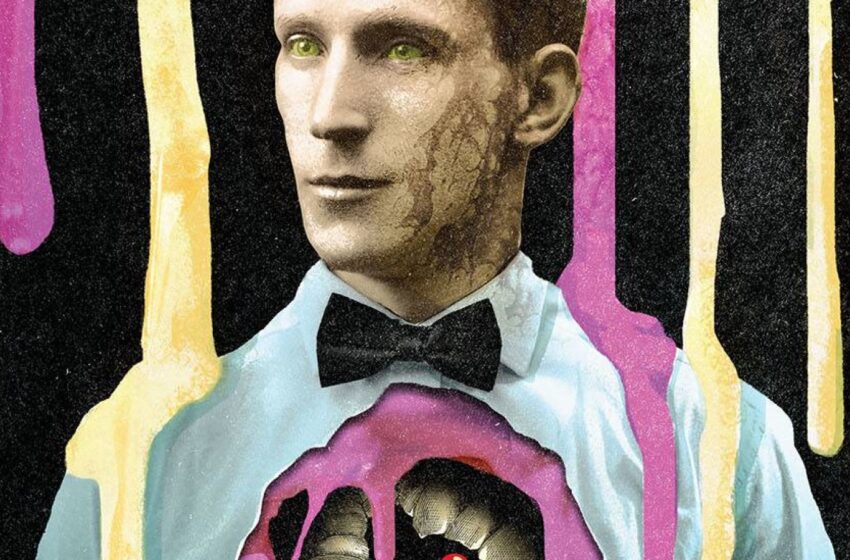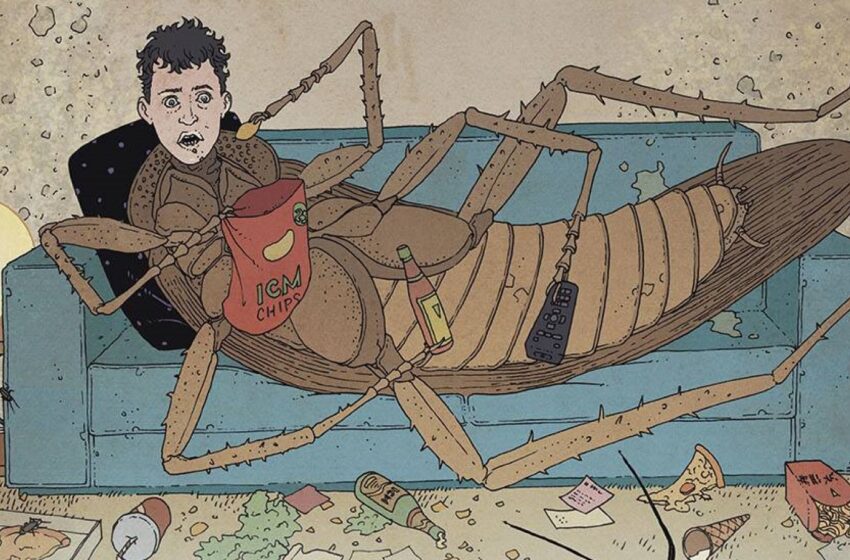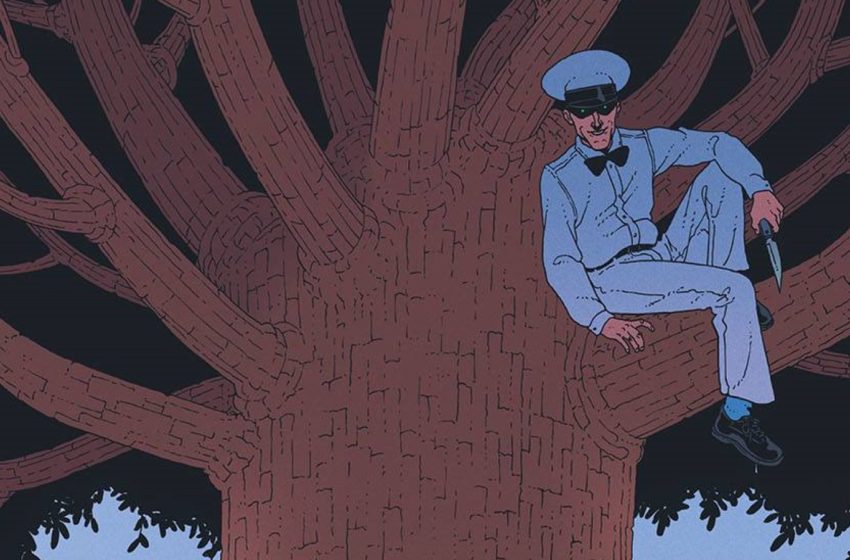Lie in the grass, next to the mausoleum where the creepy, crawly things will slither over your bones as you decay into the dry dust of timelessness. But before that, before you’re just a line in a review or on a tombstone, you’ve got to hit the ground in the overstuffed anniversary Ice Cream Man #25, written by W. Maxwell Prince, drawn by Martin Morazzo, colored by Chris O’Halloran and lettered by Good Old Neon.
Will Nevin: Ari, what do you think about starting our Ice Cream Man coverage with #25? I guess that’s not entirely accurate since we did Haha, but it still feels strange coming in at what is — in all likelihood — the backend of this series. (Feel free to go on a Savage Dragon tear and prove me wrong, team.)
Ari Bard: It feels a bit strange, Will. At this point, it’s no secret how good this series is. It consistently does pretty great numbers for an Image book, and sales is one of the primary factors for why the series is still going. It is a remarkable case study, however, because of the unique format, evolution and overall journey the title has been through.
Prince, Morazzo, O’Halloran and Good Old Neon have delivered an extraordinary level of experimentation when it comes to form and genre, and we’ve seen the title become more self-aware, create its own miniature universe and then sort of change into whatever Prince wants it to be. In some ways it feels like one of the most organic comics I’ve read in that sense.
Will: I don’t think I would love it as much if it weren’t so creative — an Ice Cream Man unwilling to rip up the format each time out simply wouldn’t be Ice Cream Man. Issue #25 is an accomplishment for any independent series, but it’s especially impressive for a book that has delivered such timely and consistent excellence. I don’t know if we’ll get a chance to celebrate #50 (More on that later, Loyal Content Consumers), so how do you reflect on this particular milestone, Ari?
Ari: I think for an anthology with very few consistently connecting elements, it is a remarkable achievement. You can see the impact that primarily the experimentation and dark tone had on readers just by looking at readership and the lack of decline you normally see. I can’t really think of a similar type of anthology that’s been anywhere near this successful, and the creative team has definitely found a niche in that sense. Their limitations are simply idea-driven and not narrative-driven. There’s largely no weight placed upon where the series as a whole needs to go, but rather whether there is a new story to be told in the next issue, and that’s a much different style of comics.
Will: I am a big, big mark for anthologies, whether it’s Legends of the Dark Knight or that Trek book the cowards at IDW only made a limited series out of. It’s so nice to see one doing so goddamned well. Getting into the substance of the thing, I want to look at how well this reads, the penumbras and emanations and references to other ICM chapters and what the backup story might portend. Anything else we need to cover?
Ari: I think you covered it, Will!
A Beginning

Will: ICM is normally an engaging read with few if any duds (I didn’t care as much for the prose Tonight Show riff, but hey, it was a gutsy experiment) but there was something that turned this one into a real page flipper. Maybe it was the overall story with the moving vignettes sprinkled throughout. Maybe I was just in a good mood. What did you think about the overall readability of this one?
Ari: The creative team did a great job maintaining suspense throughout the issue. The sort of freefall “nervous butterflies” type feeling you get on a roller coaster is the sort of trepidation I feel while reading a lot of Ice Cream Man issues, and it fits rather nicely with this one. It was well paced and hopped around smoothly between the various vignettes, as you said.
I will say that I think the ending was rather abrupt, similar to a plane crash, I suppose, but it wasn’t in a way that bothered me very much. With a lot of Prince’s work lately, I’ve been getting a feeling of, “Is that it?” I’m not sure if the reason lies with my expectations or if the purpose of Prince stories seems to have drifted more and more to getting whatever he’s feeling out of his system, but the main story in Ice Cream Man #25 left me feeling that way as well.
Will: Let’s talk about that ending. We get this queer profession of love between the two pilots as the plane is going down only to later reveal a cockpit voice recording that was … definitely not that. How did you read that?
Ari: As simple and dark as it may be, I think the ending here conveys that dramatic moments in the end are never as dramatic or beautiful as you’d hope. That catharsis that Ned might be looking for or the solution that Harold is looking for simply doesn’t exist. All that is certain is death itself.
Will: Do I have a joke to undercut that point as a transition?
No, I do not.
Some Middle

Will: Let’s see if I can get all of the non-Twilight Zone references from this issue. Thematically and structurally, this is a callback to #5 with the idea of falling to one’s death over the course of an issue. The drug-addicted characters featured go back even earlier to #2. And certainly the backup story referencing the timeless struggle between Riccardus and Caleb was examined most notably in the series’ third arc. Did you catch any other references? I know this is a series that likes to make nods toward what has come before, but this issue — perhaps owing to its milestone status — did an exceptional (and organic) job of speaking to so much.
Ari: I suppose if you really wanted to reach, there are a lot of characters that could call back to previous issues if you want to imagine it so, but I don’t see anything else explicit. Whenever I catch nods and references, I think they’re pretty neat, but they’re never something I look for even in a series like Ice Cream Man, which is so full of them. I find them to be a rather empty topping on the proverbial sundae of possible tools one can use in their comics. The references were more organic than they’ve been in the past, however, and I appreciated that.
Will: I’ll agree with you on the substance — searching for Easter eggs can be an exhausting process that doesn’t add to the merits of the overall work — but for some reason, it always hits different in this book.
Ari: It does flesh out some of the loose threads in this world of very messed up stories.
To What End?

Will: More than any other ongoing series, I’m preoccupied with how and when this one will end. In talking with Prince in the past, he suggested that the end of the last arc might be the series’ conclusion or a point where he’d stop for a longer hiatus. I’m glad that didn’t happen because I’m a selfish bastard, but after reading this, I went to check the solicits because I thought this could have functioned nicely as a conclusion to the book. (For the record, at least #26 and #27 are in previews.)
What about you — do you think this could have served as an endpoint? And what do you think about the tease we got at the end — that this series could end with the trial of Riccardus?
Ari: I am convinced that, beyond a wrapping up of larger extradimensional events that we learned about in the second and third arcs that’s probably been planned for a while as a way to end the series, the fate of Ice Cream Man lies mostly in how useful Prince still sees the series. As I have sort of mentioned earlier, I think there was so much focus on experimentation, genre and form in the earlier issues, and it has felt more like an outlet for Prince to vent his cynicism at the world and then play with it a bit during the past few issues. I just hope that the series doesn’t overstay its welcome and that it continues to have a strong baseline quality.
Will: Here’s a depressing thought experiment for you: What would a declining Ice Cream Man look like? It’s not going to circle the drain plot-wise like The Walking Dead. Would it just stop being creative?
Ari: I think a declining Ice Cream Man would just be a vent session where Prince and Morazzo spew anxieties into the void without having any secondary take or goal, and to be honest, I think that a couple of recent issues may have come close to it. That doesn’t mean they were bad, because at the very least, they still had something to say, which is more than can be said for many comics out there.
Let’s hope Ice Cream Man never fully turns into that.
Sticky Sweet Treats
- “There is no wing” is a great punchline to the William Shatner/John Lithgow Twilight Zone bit.
- The (sadly) limited Star Trek anthology was Waypoint, and it was really good.






